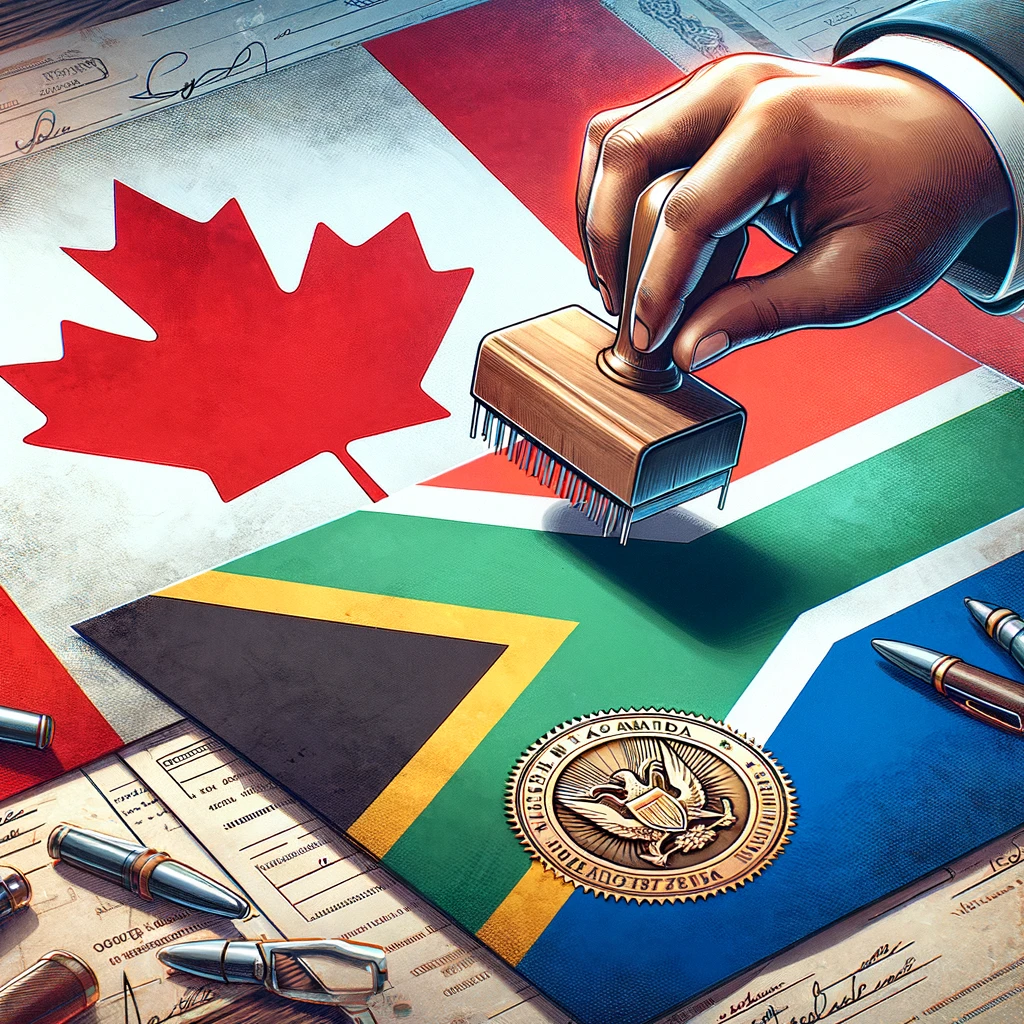Canadian Apostille for South Africa
January 11, 2024, marked a significant milestone in the realm of international document authentication for Canada. By acceding to the Hague Apostille Convention, Canada has simplified the validation process of official documents for use in South Africa and other member countries. This development holds particular significance for individuals and organizations needing to authenticate Canadian documents for South African use.
Understanding the Apostille Process for South Africa
An Apostille is a form of certification issued by a competent authority in a country that is part of the Hague Apostille Convention. This certification confirms the authenticity of the signature, the capacity in which the signer has acted, and, where appropriate, the identity of the seal or stamp which the document bears. The need for an Apostille arises in various scenarios, such as:
- Educational Endeavors: Students applying to South African educational institutions must have their Canadian academic records apostilled.
- Business Transactions: Corporations engaging in cross-border deals require authenticated legal documents like articles of incorporation.
- Immigration Processes: Individuals immigrating to South Africa need to apostille birth certificates, marriage certificates, and police clearance documents.
- Real Estate Matters: Buying property in South Africa necessitates the authentication of financial and legal documents from Canada.
- Employment Opportunities: Employment contracts and professional qualifications need verification for those seeking employment in South Africa.
Types of Documents Requiring Apostille for South Africa
- Academic Records (Diplomas, Transcripts)
- Birth and Death Certificates
- Marriage and Divorce Certificates
- Legal Agreements and Contracts
- Corporate Documents (Incorporation certificates, Financial statements)
- Power of Attorney
- Court Documents
- Police Clearance Letters
Navigating the Apostille Process in Canada
To facilitate the use of Canadian documents in South Africa, it is essential to obtain an Apostille from either Global Affairs Canada or the provincial competent authority, depending on the document's origin. Each province, including British Columbia, Alberta, Ontario, Saskatchewan, and Quebec, has its own designated authority responsible for issuing Apostilles. For federal documents, such as immigration papers or documents issued by federal courts, Global Affairs Canada serves as the competent authority. In contrast, provincial documents, like birth certificates or educational documents issued within a province, require an Apostille from the respective provincial authority. This process ensures that whether your document originates from a federal or provincial source, it will be recognized and accepted in South Africa under the Hague Apostille Convention. With our expertise at Global Document Solutions, we assist in determining the correct authority for your specific documents and streamline the process for obtaining the necessary Apostille, ensuring a smooth and efficient authentication process.
Why Choose Global Document Solutions?
Global Document Solutions, with over 30 years of expertise, stands as a premier choice for handling Apostille services. Here’s why:
- Expertise and Reliability: Three decades in the field have equipped us with unparalleled expertise in document authentication and legalization processes.
- Efficient Processing: We understand the importance of time in document verification. Our streamlined process ensures quick and reliable service.
- Tailored Solutions: Every document is unique, and so are your needs. We offer customized services to meet your specific requirements.
- Up-to-Date Knowledge: Our team is always abreast of the latest changes in international document laws, ensuring compliance with current standards.
- Comprehensive Service: From advising on the type of authentication needed to delivering the apostilled document, we manage the entire process.
Conclusion Trust The Experts @ Global Document Solutions
Canada's accession to the Hague Apostille Convention signifies a pivotal advancement in simplifying international document authentication. For Canadians dealing with South Africa, this change brings efficiency and clarity. Global Document Solutions, with its rich experience and dedicated service, stands ready to assist in navigating this streamlined process, ensuring your documents are authenticated swiftly and accurately.


